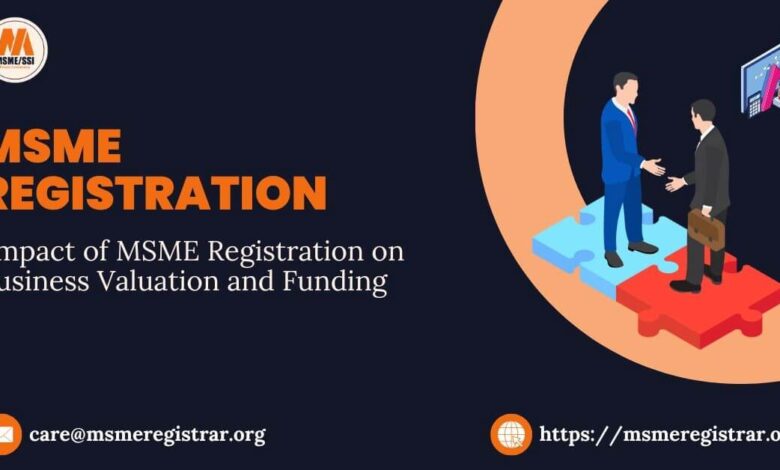Impact of MSME Registration on Business Valuation and Funding

Understanding MSME Registration
Before delving into its impact, it’s essential to understand what MSME registration entails. MSME registration is a government initiative aimed at recognizing and supporting small and medium enterprises. The registration process typically involves providing basic business information, such as turnover, investment in plant and machinery, and employment details. Once registered, MSMEs become eligible for various benefits, including financial assistance, subsidies, and preferential treatment in government procurement.
In today’s dynamic business landscape, small and medium enterprises (SMEs) play a crucial role in driving economic growth and innovation. However, accessing funding and accurately valuing these enterprises can be challenging. MSME (Micro, Small, and Medium Enterprises) registration offers a structured framework that not only enhances the credibility of these businesses but also impacts their valuation and ability to secure funding.
Enhanced Credibility and Perception
One of the immediate impacts of MSME registration is the enhanced credibility and perception of the business. Registering as an MSME demonstrates compliance with government regulations and standards, which can instill confidence among investors, lenders, and other stakeholders. This increased credibility can positively influence the perception of the business, making it more attractive to potential investors and lenders.
Access to Financial Assistance and Subsidies
MSME registration opens doors to a wide range of financial assistance programs and subsidies offered by the government. These programs may include subsidized loans, interest rate concessions, and grants for technology adoption, infrastructure development, and skill enhancement. Access to such financial assistance can significantly bolster the financial health of an MSME and contribute to its valuation by strengthening its balance sheet and cash flow position.
Facilitates Collateral-Free Funding
One of the significant challenges faced by MSMEs when seeking funding is the requirement for collateral. Traditional lenders often demand collateral as security against the loan, which can be a hurdle for small businesses with limited assets. However, MSME registration can facilitate collateral-free funding through various government schemes and initiatives that prioritize financial support to registered enterprises based on their creditworthiness and track record rather than collateral.
Streamlined Documentation and Due Diligence:
MSME registration involves the submission of detailed information about the business, including financial statements, operational metrics, and compliance records. This process not only ensures transparency but also streamlines documentation and due diligence procedures for potential investors and lenders. Having comprehensive and up-to-date information readily available can expedite the funding process and mitigate risks associated with incomplete or inaccurate data.
Valuation Impact
The impact of MSME registration on business valuation is multifaceted. Firstly, the enhanced credibility and perception resulting from registration can positively influence the perceived value of the business. Investors and acquirers may assign a premium to registered MSMEs due to their compliance with regulatory standards and eligibility for government benefits.
Government-Sponsored Financial Assistance Programs
One of the most significant benefits of MSME registration is eligibility for government-sponsored financial assistance programs. Governments around the world offer a range of schemes aimed at supporting the growth and development of registered MSMEs. These programs may include subsidized loans, grants, interest rate concessions, and financial incentives for technology adoption, export promotion, and capacity building.
Subsidized Loans and Credit Facilities
Registered MSMEs often have access to subsidized loans and credit facilities offered by government agencies, banks, and financial institutions. These loans typically come with lower interest rates, longer repayment periods, and relaxed collateral requirements, making them more affordable and accessible for small businesses. Subsidized loans can be used for various purposes, including working capital, expansion, machinery purchase, and infrastructure development.
Venture Capital and Private Equity Investment
MSME registration can also attract interest from venture capital firms, private equity investors, and angel investors looking to invest in promising small businesses. These investors may be attracted to registered MSMEs due to their enhanced credibility, eligibility for government incentives, and potential for growth and scalability. Venture capital and private equity funding can provide MSMEs with the capital needed to scale operations, enter new markets, and invest in innovation.
Crowdfunding and Peer-to-Peer Lending Platforms
In recent years, crowdfunding and peer-to-peer lending platforms have emerged as alternative sources of funding for MSMEs. These platforms allow businesses to raise capital from a large number of individual investors or lenders through online crowdfunding campaigns or lending marketplaces. MSME registration can boost the credibility of crowdfunding campaigns and increase investor confidence, thereby improving the chances of successfully raising funds through these platforms.
Export Finance and Trade Credit Facilities
Registered MSMEs engaged in export-oriented activities may also benefit from export finance and trade credit facilities offered by banks and financial institutions. These facilities provide financing solutions tailored to the specific needs of exporters, such as pre-shipment finance, post-shipment finance, export credit insurance, and factoring services. Access to export finance can enable MSMEs to fulfill large export orders, enter new international markets, and mitigate the risks associated with cross-border trade.
Diversifying Funding Sources
Registered MSMEs should explore diverse funding sources beyond traditional bank loans and government schemes. This includes alternative financing options such as venture capital, angel investment, crowdfunding, peer-to-peer lending, and trade finance. Diversifying funding sources not only spreads risk but also increases the likelihood of securing financing tailored to the specific needs and growth stage of the business.
Building Strong Relationships with Lenders and Investors
Establishing strong relationships with lenders, investors, and financial institutions is crucial for MSMEs seeking funding. This involves networking, attending industry events, participating in pitch competitions, and actively engaging with potential investors and lenders. Building trust and credibility through transparent communication, regular updates, and a solid business plan can significantly enhance the chances of securing funding.
Optimizing Financial Management and Reporting
Maintaining accurate financial records and demonstrating strong financial management practices are essential for attracting funding. Registered MSMEs should implement robust accounting systems, monitor key financial metrics, and prepare detailed financial projections and reports. Clear and concise financial reporting instills confidence in investors and lenders, showcasing the business’s financial health and growth potential.
Embracing Technology and Innovation
Incorporating technology and innovation into business operations can enhance competitiveness and attract funding. Registered MSMEs should leverage digital tools, automation, and emerging technologies to streamline processes, improve efficiency, and drive innovation. Demonstrating a commitment to innovation and staying ahead of industry trends can make MSMEs more appealing to investors looking for high-growth opportunities.
Seeking Professional Guidance and Support
Navigating the funding landscape can be complex, especially for small businesses with limited resources and expertise. Registered MSMEs should seek professional guidance and support from financial advisors, consultants, and industry experts. These professionals can provide valuable insights, advice, and connections to potential funding sources, helping MSMEs make informed decisions and secure the right financing for their needs.
Note: Click here to update Udyam certificate today.
Conclusion
MSME registration has a significant impact on the valuation and funding prospects of small and medium enterprises. By enhancing credibility, facilitating access to financial assistance, and streamlining documentation and due diligence processes, registration strengthens the financial health and market positioning of MSMEs, thereby increasing their attractiveness to investors and lenders. As governments continue to prioritize support for MSMEs, leveraging registration benefits becomes increasingly crucial for unlocking growth opportunities and maximizing enterprise value.






